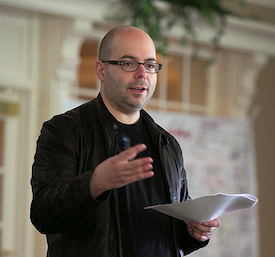Psychology Professor Notes Advances in Poker Strategy for WSJ
On Friday The Wall Street Journal ran an essay by Christopher Chabris called “The Science of Winning Poker” in which the Harvard Ph.D. and Associate Professor of Psychology at Union College describes and assesses the increased influence of math-based strategy on the game over recent years.
While the treatment of the topic is somewhat superficial — especially to those already familiar with the phenomenon being described — the article does present to a wider audience the evolution of poker strategy over recent years, thereby reinforcing ideas of the game’s significant skill component.
In addition to numerous scientific studies, Chabris is the co-author with Daniel Simons of The Invisible Gorilla: How Our Intuitions Deceive Us (2010) which explores the many ways our understanding of the world is undermined by our imperfect sensory awareness. The book’s title comes from a famous “viral” video created by the authors as a test of selective attention in which viewers are asked to count how many times subjects pass a basketball, their focus on that task causing most to fail to notice someone in a gorilla suit walking through the scene.
Turning his attention to poker, Chabris similarly attempts to describe in layperson’s terms the emergence of higher-level strategic thinking in poker as well as to consider reasons for the development, and is by and large successful in doing so.
The article begins with mention of the recent playing out of the first part of the 2013 World Series of Poker Main Event as a shorthand way of identifying the game’s growth in popularity over the last decade. From there Chabris points out how this growth has influenced game play including having incorporated more sophisticated math-based strategies and ideas from the realm of game theory.
Such advances in strategy, Chabris notes, “have inspired new ideas in poker strategy and new advice for ordinary players.” He then provides a simple example from Texas hold’em illustrating how in theory a higher pocket pair stands to beat a lower one most of the time in preflop all-in situations, although in practice the higher pair does sometimes lose.
That idea of expected value leads Chabris to share an explanation of what is commonly known as “Sklansky Bucks” or the theoretical “reward” gained from one’s action in a given hand, although Chabris doesn’t name the concept as such. Chabris also misrepresents the concept somewhat when he suggests “Poker theorist David Sklansky once wrote that you should consider yourself a winner as long as you had the higher probability of winning the hand when all of the money went into the pot.”
Sklansky of course likely would not suggest that a player losing such a hand should consider him or herself a “winner,” but rather should recognize he or she played the hand correctly according to the Fundamental Theory of Poker upon which the idea of “Sklansky Bucks” is based. Sklansky presents his Fundamental Theory of Poker in the much acclaimed The Theory of Poker (1987).
Chabris also shares Phil Galfond’s later elaboration on Sklansky’s idea as presented in a 2007 BLUFF magazine article (archived here at ESPN), humorously designated as “Galfond Dollars” by the author. In essence, Galfond explains the concept of putting opponents on hand ranges and from there establishing different probabilities to indicate one’s expected value in a given hand, providing another way of evaluating one’s play afterwards.
After presenting these concepts, Chabris notes how such ideas can and should be incorporated into one’s decisions at the table, and even delves into the complicated subject of “balancing” one’s range so as to make it more difficult for opponents to be able to put one on particular hands or narrow down hand ranges.
Chabris concludes by asking “Why this sudden leap forward in the strategy of a game that has existed for over a century?” (Of course, poker has been around for closer to two centuries, perhaps more.) The influence of computer-supported analysis is one factor, he notes, but “the real cause of the advances that have accompanied the poker boom has been the boom itself.”
In other words, with many more players (“10 times more,” says Chabris, ostensibly alluding to the player pool of a decade ago), “the collective creativity and thinking power of the poker world has grown by at least an order of magnitude.”
While not necessarily a ground-breaking assertion — indeed, there are myriad examples of cultural phenomena being similarly affected both by technology and increased popularity — Chabris nonetheless points out how the explosion of popularity of poker has further fostered more advanced strategic thinking which has by now begun filtering down even to those first becoming acquainted with the game.
In other words, while Chabris perhaps makes an obvious point, it is one less studious observers of poker’s growth and development may not have noticed — kind of like that gorilla walking through the video figuring in Chabris’s earlier research.




















COMMENTS